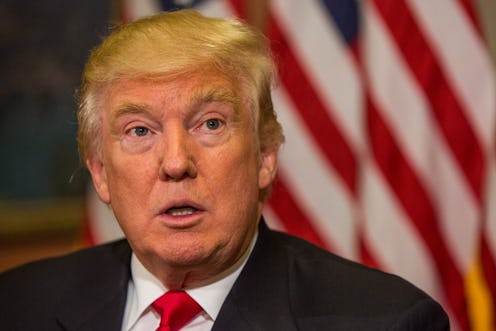News
Could The Electoral College Dump Trump?
So, let's say you're unhappy about the election of Donald Trump to be the 45th president of the United States. It's a slightly safe assumption, after all ― Democratic nominee Hillary Clinton did win the popular vote, and by a margin that's only increasing as more ballots are counted. It's enough to make a concerned citizen wonder: does the electoral college have to elect Trump? Or would it be possible for it to upend the state-by-state system, and adhere to the majority's will instead?
Well, here's the simple answer: yeah, the electoral college could overthrow Trump. But doing so would be immensely controversial, destabilizing, and unprecedented, so you absolutely shouldn't hold your breath. As it stands now, Trump is sitting at 290 electoral votes, but that number figures to rise even further, with 20 votes still left outstanding.
Assuming he stays at 290 ― which again, is not a safe assumption, as with Michigan he'd get up to 306 ― a full 21 electors would have to ignore the will of their states and break for Clinton instead, or a third-party option like Gary Johnson. In short, in order to thwart Trump's clear path to the White House, there would need to be a mass exodus on the part of his electors. This would be completely unprecedented in American political history.
If enough electors abandoned Trump and backed Clinton, then it would actually be possible for them to hand her the presidency, and while it would be intensely inflammatory and destabilizing, it would be a more democratic outcome, owing to Trump getting thumped in the popular vote. If both candidates finished in a 269-269 tie, however, not even that would keep Trump from the White House, as it'd then be up to the GOP-led House of Representatives to pick the winner. In other words, absent 270 electoral votes going to Clinton, all roads lead to Trump.
It's hard to overstate what a nightmare an electoral college overthrow would be with respect to an already polarized voting public, also. Especially as it would reinforce the notion of a "rigged system" that Trump's been proclaiming for months, insisting that the powers-that-be desired a Clinton administration.
In short, however deeply you might be hoping for something, anything to interrupt this chain of events, it's entirely unlikely, and potentially destructive for the electoral college to try to change course now. Simply put, the next chance the voters have to remove Trump from office will be in November of 2020 ― hopefully political progressives and his critics can rebuild until then, and mount a more successful effort to topple his candidacy.
